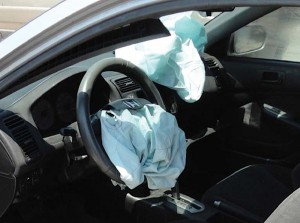The failure of an airbag in a new Volkswagen Tiguan could lead to a huge expansion of the ongoing Takata recall – something that has already impacted more than 33 million vehicles sold around the world.
Two U.S. senators are demanding that the Japanese supplier recall all vehicles using its airbags. Such a move could add millions, and likely tens of millions, of vehicles to the ongoing recall that has, until now, focused on older products using Takata airbags.
The latest twist in the story follows word that Volkswagen alerted the National Highway Traffic Safety Administration about the faulty deployment of a Takata airbag on a 2015 model Tiguan sport-utility vehicle. During the June 7th incident, a collision with a deer caused a side-impact airbag to deploy with too much force.
A similar problem with the Takata airbag in older vehicles has been linked to at least eight deaths and over 100 injuries, the result of plastic and metal shrapnel being blasted into the passenger compartment. Volkswagen said it was not sure if the driver in the latest incident received any injuries but noted no medical treatment was needed.
(Hard hit by Takata recalls, Honda nonetheless posts a jump in earnings. Click Here for more.)
After initially insisting the problem was limited to vehicles used in states with high humidity, Takata recently agreed to the recall of millions more vehicles in other states under heavy pressure from NHTSA.

A Takata airbag after a crash. The supplier hasn't been able to pinpoint the problem causing the airbags to explode.
The June incident is particularly troubling for a variety of reasons. First, it involves a new vehicle, rather than one dating back as much as a decade. Until now, the general consensus is that design or manufacturing problems caused the explosive ammonium nitrate used in Takata airbag inflators to deteriorate over time and malfunction when triggered.
The recent failure, meanwhile, involved a product from VW, one of the two companies using Takata airbags that had not ordered a recall. The other is Tesla. A total of 11 other makers have been affected by the Takata problem.
Causing further concern, the June incident involved a side-impact airbag. Until now, the problem has appeared to be limited to front-mounted airbags.
“This directly undercuts Takata’s continued insistence — despite growing evidence to the contrary — that the flaws in its air bag inflators are limited to prior designs in older model cars and only present when the air bags have prolonged exposure to extremely humid conditions,” said Democratic Senators Ed Markey and Richard Blumenthal, among the two most active safety advocates on Capitol Hill.
Until it faced a harsh grilling in Washington earlier this summer, critics had accused Takata of dragging its feet on the airbag problem. Its CEO only belatedly addressed the issue as the company agreed to NHTSA’s demand for an expanded recall.
(Hammered by biggest fine ever, Fiat Chrysler aims to fix broken safety system. Click Here for more.)
The supplier – which is already struggling to provide the millions of replacement airbags now needed – is believed to be facing major financial trouble, some analysts previously warning Takata could be forced into bankruptcy even without any new recalls.
The Japanese company issued a statement saying it will comply with the request for more information, noting in a Thursday statement, “Takata is investigating the cause of the inflator malfunction on June 7, which we believe is unrelated to the previous recalls, and are cooperating closely with NHTSA and the vehicle manufacturer.”
Its statement asserted that, “Driver safety is our top priority,” adding that, “We continue to share testing data with NHTSA and vehicle manufacturers.”
The latest flap adds to the growing level of concern about airbags, in general, though much of the focus is on older bags that might suffer from the hazards of time, such as heat, cold and the extreme vibrations automobiles routinely face.
NHTSA Administrator Mark Rosekind last month told TheDetroitBureau.com the agency is taking a broad look at older airbags to see if they might suffer greater malfunctions as they age. So far, however, the safety agency has not launched a specific probe beyond the one involving older Takata bags.
(Hidden killers? What happens when airbags age? Click Here for exclusive report.)


Time to find out what exactly is going on and if there are multiple issues.